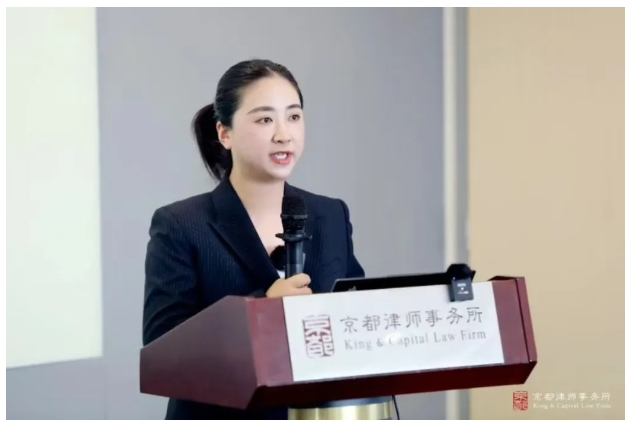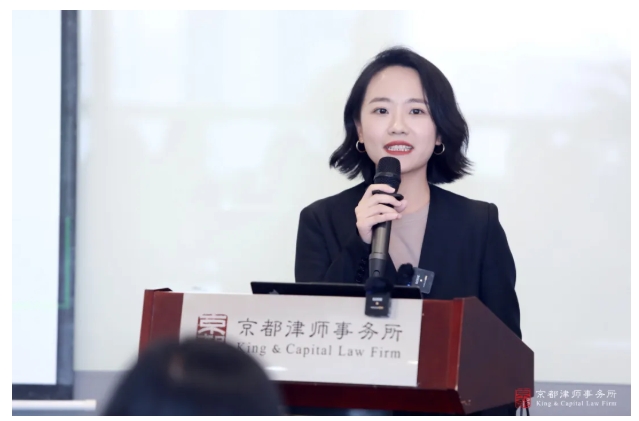On April 23, 2025, Beijing King&Capital Law Firm held the 30th Anniversary Training Series “Interpretation and Practical Discussion of the Judicial Interpretation of the Marriage and Family Section of the Civil Code (II)”. The training was hosted by Wu Weichao, a lawyer, and Cai Kangmiao, Yuan Yingyan and Yin Xi of the Civil and Commercial Department used recent hot cases as the starting point to discuss the core issues such as changes in the provisions, theoretical kernel, and practical impacts, and to provide professional insights and solutions for the parties in matrimonial cases from the perspective of balancing the interests of the clients and the parties.

Wu Weichao
At the beginning of the event, the moderator, Mr. Wu Weichao, suggested that we focus on the Judicial Interpretation of the Marriage and Family Section of the Civil Code (II), which is not only related to the professional improvement of legal practitioners, but also closely related to the life of each of us. Marriage and family are the cornerstone of society and the harbor of our hearts.

Mr. Cai Kangmiao
Mr. Cai Kangmiao shared the topic of the first 11 articles of the Judicial Interpretation of the Marriage and Family Section of the Civil Code (II), which summarizes the 11 articles into two aspects, i.e., marital validity and property division. Marriage effect is divided into bigamy, false divorce, creditor revocation three aspects, property division is divided into: cohabitation analysis, give property between husband and wife, network reward, to recover the transfer to the third party, parents contribute to the purchase of the house, equity transfer, give up the inheritance and so on. Cai Kangmiao lawyer combined with the past experience and judicial interpretation of the provisions of the legislative background and far-reaching intention.
Cai Kangmiao lawyer put forward the judicial interpretation of the highlights of the transfer of housing registration behavior with “give” rather than “gift”, the judicial interpretation of the word more objective, while combining the legal theory on the agreement between husband and wife is the establishment of civil subjects, change, terminate the civil legal relationship between the agreement. The agreement between husband and wife is the agreement between civil subjects to establish, change and terminate civil legal relations. But marriage, adoption, guardianship and other identity relationship agreement, the application of the identity relationship of the legal provisions; no provisions, according to the nature of its reference to the application of the provisions of the contract law. Therefore, if there are provisions on marriage, they should be applied first, and it is also believed that Article 32 of the Interpretation (1) of the Marriage and Family Section of the Civil Code has been replaced by Judicial Interpretation 2, which makes it clear that the registration of the transfer of a couple's house, whether before or after marriage, does not apply to the “revocability of the transfer before it is registered”.
For one party to transfer the house owned by him or her to the name of the other party or both parties, and the house between the husband and wife has been registered for transfer, in the event that the two parties fail to reach an agreement, only in line with the “shorter duration of the marriage relationship and the giving party is not at fault,” the court may decide that the house belongs to the giving party, in other words, if the marriage is longer or the giving party has missed, the court may decide that the house belongs to the giving party, or the giving party has missed. In other words, if the marriage is long or the giving party is at fault, the court can award the house to the other party. Therefore, this judicial interpretation attaches great importance to the impact of “public order and morality” on the division of property in a marriage.

Ms. Yingyan Yuan
Mr. Yingyan Yuan focused on the systematization and wholeness of the law, based on Articles 12, 13 and 14, explored how to understand the act of snatching and hiding minor children, and emphasized the legal countermeasures against snatching and hiding minor children, such as the prohibition of personality right and the precautions for personal safety protection order.
Yuan lawyers based on practical experience, combined with a wealth of cases, focusing on the role of custody disputes, i.e., fixed the fact of snatching, hiding, to solve the problem of child support during the conflict, but also for the divorce litigation to determine the party at fault, for the application of the principle of taking care of the rights and interests of the party at fault in the division of property, and claim for damages in the divorce to make a good preparation. Ms. Yuan introduced the relevant legal provisions to protect the rights and interests of minor children from the perspective of applying the principle of the most favorable to minor children.
According to her years of experience, she concluded that there are a large number of practice due to the effective legal instrument agreement is unclear, not enforceable. For lawyers in the process of representing the relevant cases, she put forward targeted recommendations: in the case trial or mediation process, to strive for the formation of a relatively detailed agreement on the children's visitation, so that the court to promote the implementation of the court to effectively determine whether the other party constitutes a refusal to fulfill, in order to determine whether the need for further disciplinary action; when the minor in the issue of visitation to be able to express their own views, the court will fully respect the minor's opinion, such as If the minor firmly refuses to visit, the court will make a final decision on this execution. Therefore, the party who does not directly support the child should actively seek to exercise his or her visitation rights when the child is not yet able to fully express his or her will, and repair the emotional connection with the child as soon as possible, so as to avoid alienation of affection due to a long period of time of vacancy, when even if he or she applies to the court for compulsory enforcement, the visitation may not be realized.

Yin Xi
Focusing on Articles 15 to 23, Mr. Yin Xi discussed the practical issues of children, stepchildren and disposition of minor children, mainly from the dissolution of the relationship between stepparents and children, the recognition of being raised by stepparents, the validity of the disposition of property in the name of minor children, the agreement not to bear the alimony, and the financial compensation in divorce. Mr. Yin raised the questions of how to advise your clients if they want to be stepfather or stepmother, and the risks of marrying a spouse with children (taking a woman marrying a man as an example), and interacted with the offline and online audience, citing a case to explain how both parents, in their capacity as legal representatives, dispose of a house purchased with the couple's common property and registered in the names of their minor children, and then claimed that they had harmed the interests of their minor children by violating the provisions of Article 35 of Civil Code to the opposite party. The people's court will not support the claim that the civil legal act is invalid on the ground that it violates the provisions of Article 35 of the Civil Code to the detriment of the interests of the minor children.
Subsequently, Mr. Yin Xi focused on the hot social issue of alimony and interpreted Article 17 from the perspective of protecting the rights and interests of minors, ensuring the payment of alimony through coercive force, and avoiding parents' evasion of their obligations through “invalid agreement” or “economic difficulties”. This not only protects the interests of children and prevents the direct support party from abusing his/her rights, but also gives the direct support party the right to recover unpaid maintenance, and links with Article 16 (Validity of Divorce Agreements), so that if it is agreed in the divorce agreement to “waive the payment of alimony”, it is necessary to examine whether it is detrimental to the interests of the children. Finally, Mr. Yin Xi advised clients to “enhance the awareness of evidence collection and prove the burden of more obligations in multiple dimensions” from the point of view of the agreement of property to children in the divorce agreement and the difficulty of determining the financial compensation in divorce in judicial practice.
The lecture was both high and deep, which not only helped the lawyers to grasp the logic of the new judicial interpretation, but also promoted further thinking on the practical strategy, and also showed the professional strength and in-depth research of King&Capital Law Firm in the field of marriage and family, attracting many online and offline audience to participate in the interactive exchanges, and the lecture was a complete success.
Translated with DeepL.com (free version)



